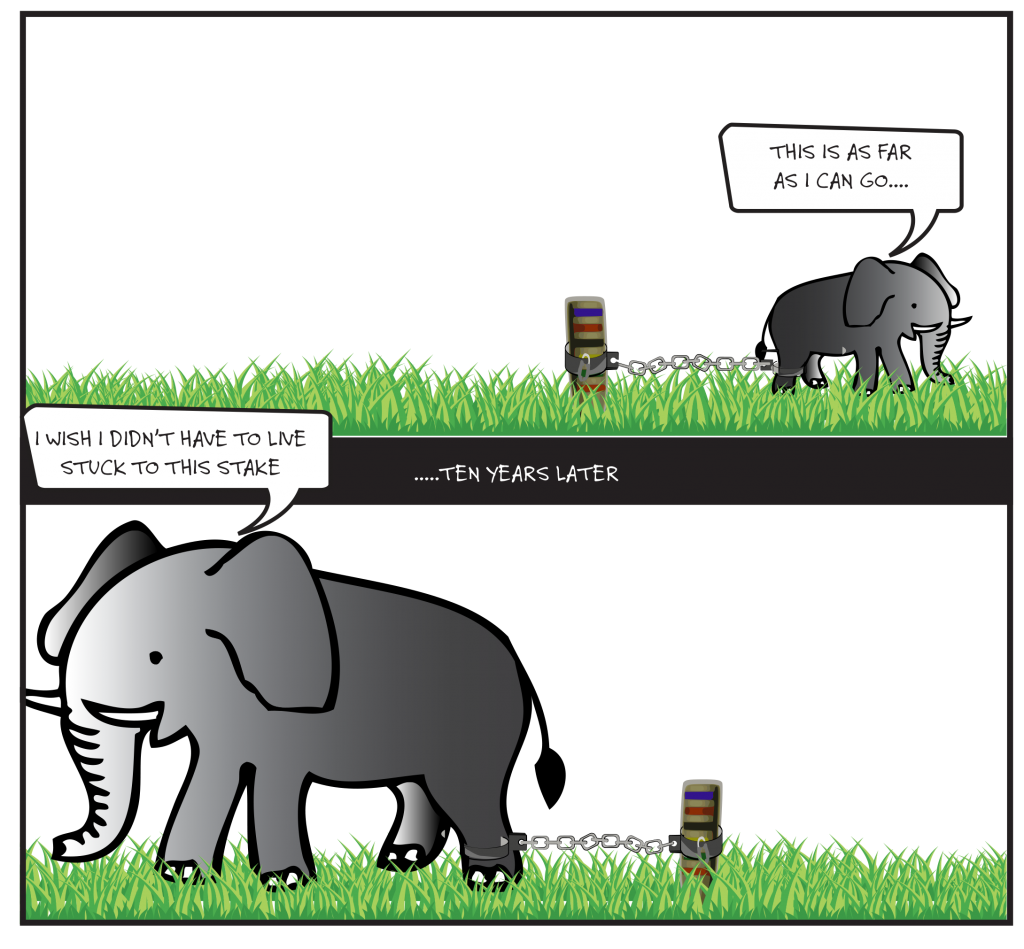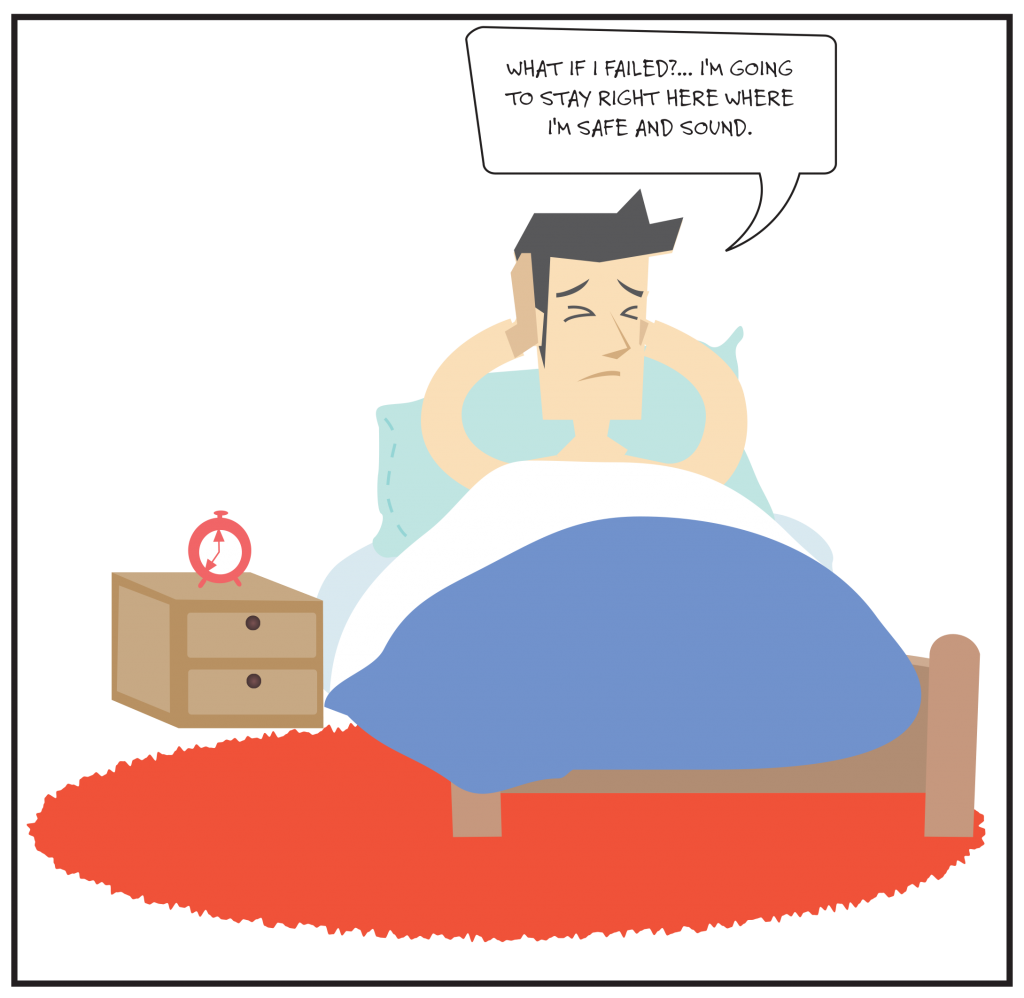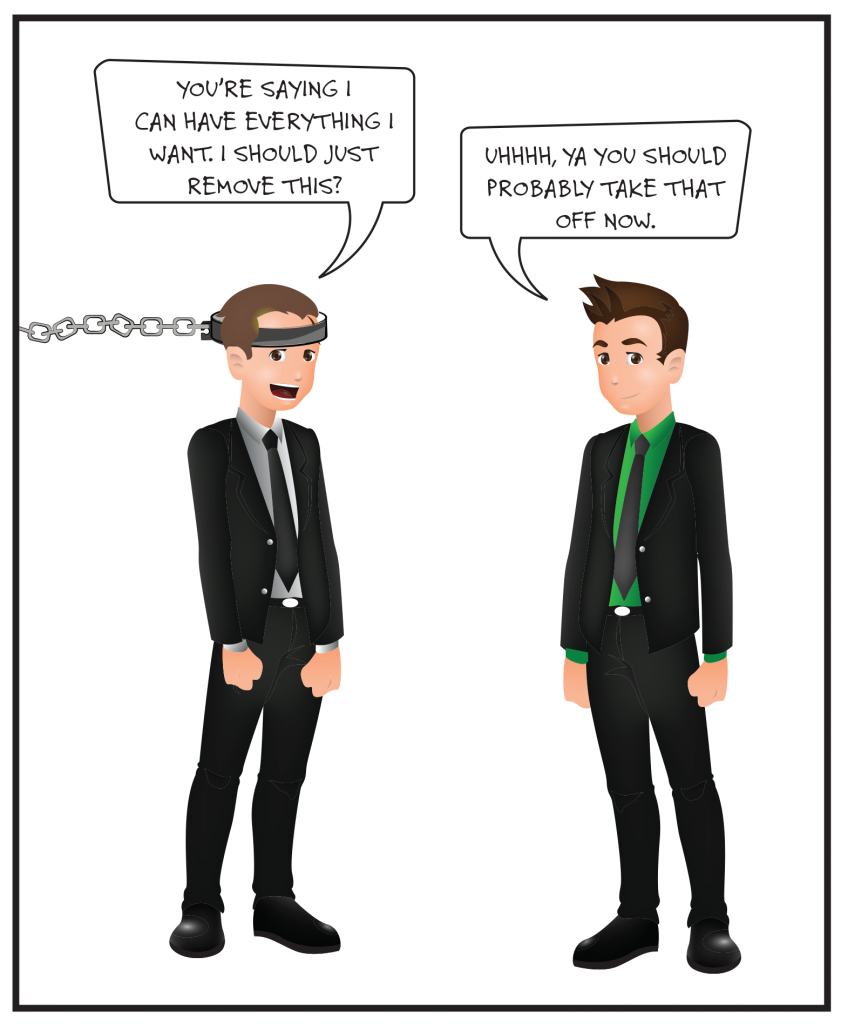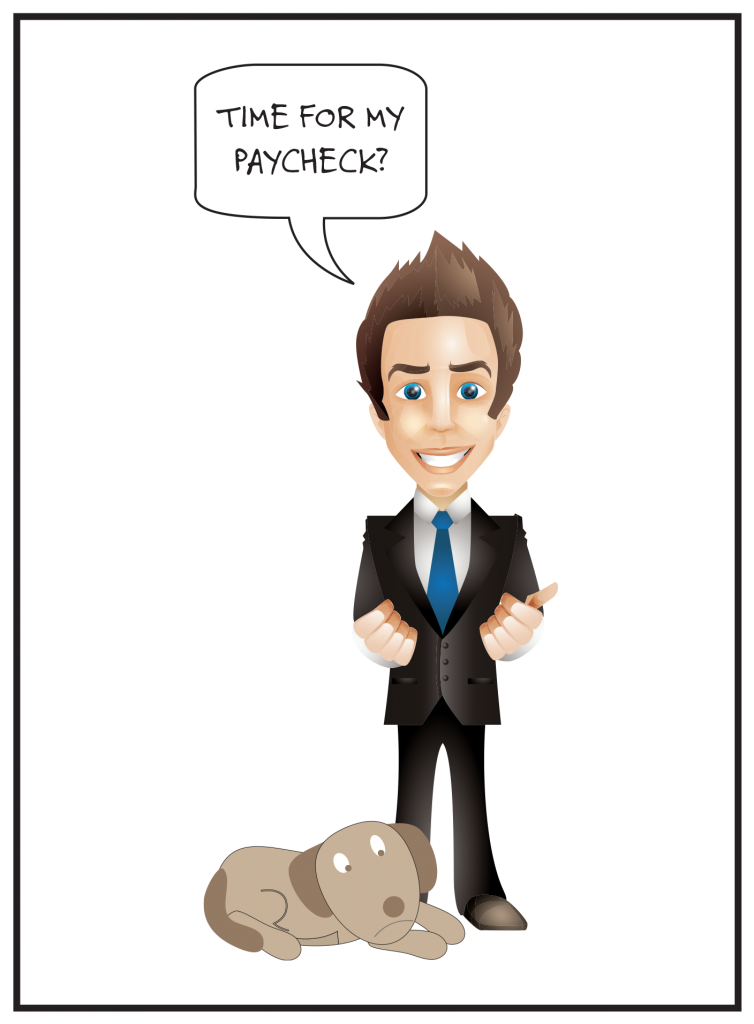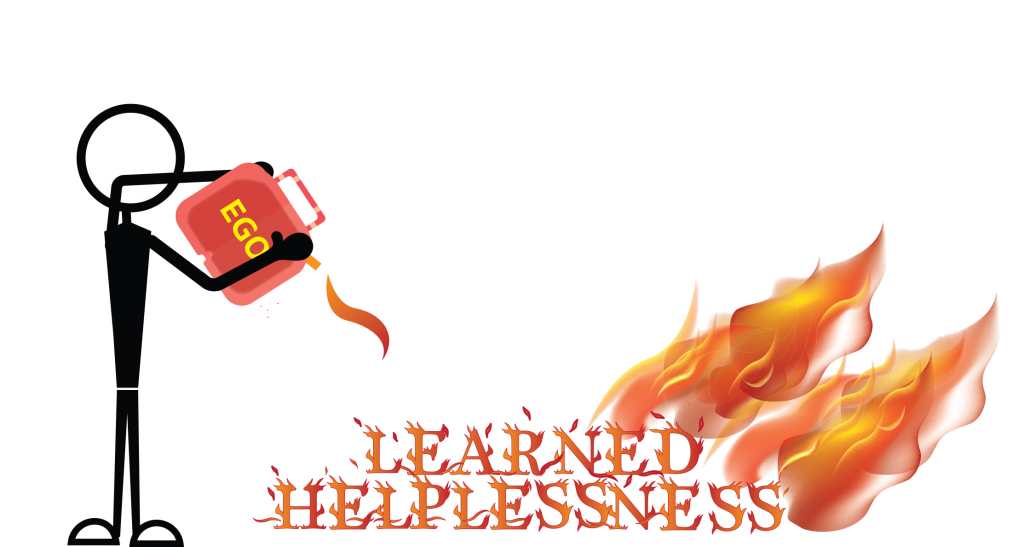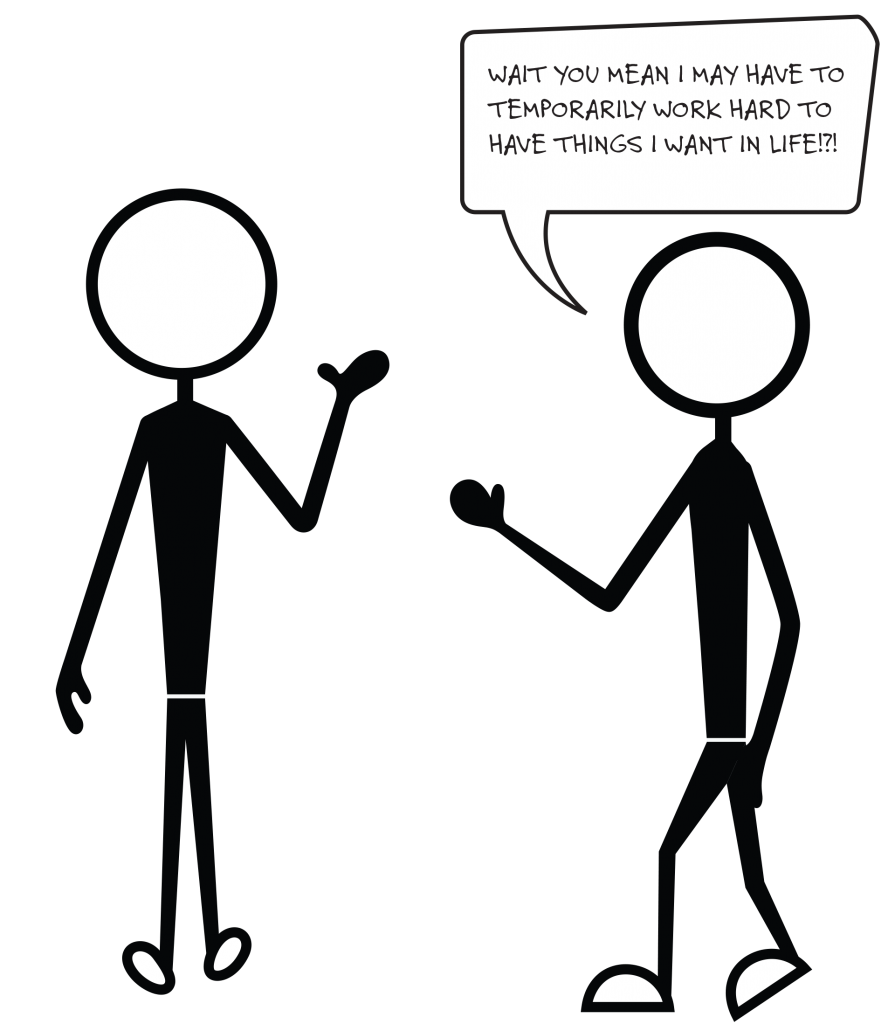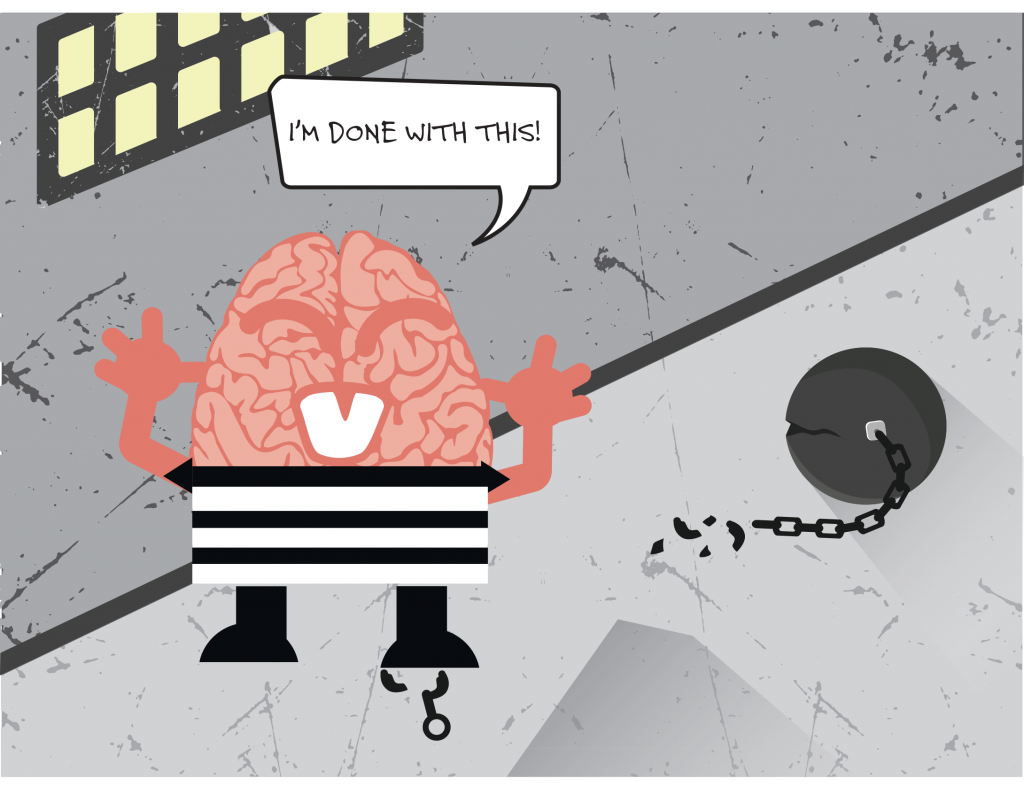What is learned helplessness?
Learned helplessness is when people feel helpless to avoid situations they perceive as negative or painful, because previous experiences have made them believe they will be unable to avoid them. This perceived lack of control makes them fail to even attempt escaping a similar fate in the future. They’ve trained themselves to believe they are helpless, and so they don’t even try.
“Learned helplessness is the giving-up reaction, the quitting response that follows from the belief that whatever you do doesn’t matter.”
– Arnold Schwarzenegger
Martin Seligman is known for discovering learned helplessness during an experiment he was performing on dogs. He would ring a bell, and give a light shock to a dog. After a while, the dog would react to the bell as if he’d already been shocked. The interesting part of the study came when Seligman gave the dogs a chance to avoid being shocked. Here’s what he did:
He would put a dog in a large crate divided by a small fence that they could easily jump over. What the dogs didn’t know was that only one side of the crate would give a shock, and the other side would not. The dogs didn’t even attempt to jump over the fence because learned helplessness made them believe the shock was unavoidable.
He then tried the test with dogs that had not previously received a shock. When those dogs heard the bell, they quickly learned that they could avoid the shock by jumping over to the other side of the fence.
Have you ever heard how to chain an elephant?
As a baby, if you chain an elephant, the elephant will learn that it cannot break free from the chain. It will also be uncomfortable if they try. So, the elephant stops trying, and accepts the fact that it cannot break free from the chain.
Even once the elephant becomes an adult, they will not attempt to break the chain, even though it would be very easy for them to do so. They have conditioned their mind to believe they can’t break free from the chain, so they don’t even try.
Learned helplessness psychology
Most people are like the elephant and the dog.
They’ve conditioned themselves with limiting beliefs of what they think they’re able to achieve, and therefore often never even attempt to achieve anything, as they’ve trained their mind to believe they aren’t capable. They assume that it would be uncomfortable to even attempt, due to the risk of failure. They accept a lifelong fate of mediocrity, to avoid the possibility of some temporary discomfort trying to achieve something that again, they haven’t even allowed themselves to believe they can achieve.
Like the elephant, most people are living with a chain attached. It’s attached to their mind, and until they break free, the chain keeps them held in mediocrity. If they just tried to break free from the mental chain, they’d realize they can literally have everything they want, they just need to be willing to break free from the chain, the one that only exists because they allow it to.
You need to uncondition yourself from thinking that failure= pain. Failure = growth. Growth leads to the ability to achieve the goals you want to achieve. So, technically the worst thing that can happen to you if you break free from learned helplessness, is the failure you so desperately seek to avoid, which would lead you exactly where you think you aren’t capable of going.
Once you understand that anything is possible for you, the scariest thought I can imagine is for you to stay shackled to the chains you voluntarily keep in your mind.
Overcoming learned helplessness
What might you be holding onto in your own life that is nothing but learned helplessness?
Are you avoiding starting a business because you tried something in the past and it didn’t work? Is learned helplessness convincing you that the next thing you try won’t work either, so you may as well not even attempt it?
Are you not asking for help because you’ve been ridiculed sometime in the past, and are holding on to the false belief that it might happen if you try again? You’re so worried that someone might think your question is stupid, instead of being more worried about the fact that learned helplessness is keeping you from ever getting the answer.
Are you not asking a girl or guy out because you’ve been rejected in the past? You assume it’ll happen again, so learned helplessness keeps you single.
How is learned helplessness affecting your income? Are you holding onto a job because of the learned helplessness that comes from accepting a paycheck? The belief that you must depend on someone else to put food on your table. You’ll lie down like the dogs and just starve without it?
It is hardly possible to build anything if frustration, bitterness and a mood of helplessness prevail. – Lech Walesa
Learned helplessness experiment
Charisse Nixon did a study with her class that proved how easy it is for people to have learned helplessness. She gave her class three different problems to solve. What she didn’t tell the class beforehand was that she had given them two different sets of problems. One half got an easy set of problems, the other received a list where the first two problems were impossible to solve. The third problem was the same for both. What happened? Well, she was able to induce learned helplessness in the group of students that received the unsolvable first two problems. Even though the third problem was easily solvable, most of them didn’t even try. They falsely assumed they couldn’t do it. This is learned helplessness at work.
You can watch a video example here:
Now, if she could get students to exhibit learned helplessness in only a couple minutes, how ingrained do you think it is if you’ve been operating under certain assumptions for years? It’s not difficult to realize that a lot of the things you do, and often don’t do on a daily basis are due to learned helplessness.
Learned helplessness examples
Imagine all of the things you aren’t even attempting in your life because learned helplessness is making you avoid them like the plague, because of some tiny little thing that happened sometime in the past, that might even be totally unrelated to what you’re currently avoiding.
Don’t even go to the gym because you assume you can’t take off the weight? Why, because of some extremely weak attempt sometime in the past?
Won’t write an article, or a book because you’re afraid you might be negatively judged because of what someone once said about your writing, years, or even decades ago? You succumb to being helpless just to avoid the same pain. You let the opinion of those who do not matter determine your future actions. Your future actions determine your future happiness. So, in essence, I would venture to bet that the majority of us are in some way allowing learned helplessness to negatively affect our happiness in certain aspects of our lives.
“So many of us choose our path out of fear disguised as practicality” – Jim Carrey
Is the path you’re on a path you’ve consciously chosen, or is it a path designed by your subconscious due to learned helplessness? Is it creating a desire to avoid situations that you perceive may include something painful or negative for you?
If dogs and elephants can so easily succumb to learned helplessness, it’s likely to assume that as humans it’s going to be significantly stronger within us due to our worry about what others think. Dogs and elephants could give a shit what others think, yet learned helplessness still controls them. Learned helplessness is multiplied within us because we don’t want to look foolish to others. Our ego is gasoline on the learned helplessness fire.
You must take action to overcome this flaw.
Let’s take a look at a relevant example:
Many people refuse to start a business with the common excuse of not having money.
That helps them to justify not having to start a business. It’s learned helplessness. If they really wanted to start a business they’d start without money, or work hard to earn the money to start. The learned helplessness keeps them from ever starting. They view themselves as ‘hopeless’ without money. They must start, or remain in learned helplessness. They must do the mental work to push through the bullshit they’ve built up in their minds. The mental work is often the hardest.
Same with not knowing what to do or not having a mentor. If someone really wanted it they’d invest in a business coach, or at least go work or intern for someone they could learn from. It’s easier to let learned helplessness take over and just stay ‘hopeless’ on the sidelines. There’s no pain there. There’s obviously no success there either, but learned helplessness has trained them to desire this hopelessness over success. It’s easier to assume they just can’t do it, instead of training their mind to realize they can, and taking the actions necessary to do it.
I’ve learned that some of the hardest work we can do is mental work. Our mental conditioning is so unbelievably important, yet because it’s below the surface most people fail to understand when it’s negatively controlling their life. Most of us understand that our outcomes are very closely tied to the goals that we set, and the habits that we form to achieve those goals. What many people don’t do is the work to both understand, and to overcome the fact that many of the goals that we have are being set based on what we do or do not believe. We may set goals lower than we should because we do not believe we are capable of more. Or worse, we may eliminate certain goals all together, because of learned helplessness.
When I help people with goal setting, I often tell them that the first step is figuring out exactly what it is that you want, so that we can work backwards to reverse engineer those results and expect achievement of the goal. Well, what is maybe an even more important step is to really take time to think about what you want, and ask yourself if there might possibly be something else, but learned helplessness is keeping you from it. This is difficult, but extremely important.
If you don’t really believe you can do something, you won’t overcome learned helplessness. If you struggle with this, attempt to find your learned helplessness with simple logic.
“I can’t start a business, I don’t have money!”(learned helplessness)
Well, what could you do to make money?
“I could get a job/an extra job but I don’t have time”(learned helplessness)
Where does all your time go?
“Well… I guess I do watch a lot of TV and go out a lot.”
If you stopped watching TV and going out, would you have time to get an extra job?
“Ya, I guess I would.”
How long would it take you to save up enough money for the business you want to start if you did that?
“Probably forever, I never have much money.”(learned helplessness)
Well, how about we just calculate the actual answer. How much extra income could you pick up if you really wanted to. How much per hour, and how many hours?
“I should be able to make $15/hr at restaurant XYZ. I could get 15-20 hours/week if I had to.”
Okay, so how much is that per week?
“I guess around $300/week, but if I did that and my other job I’d be working all the time, I couldn’t do that.”(learned helplessness)
Well, you wouldn’t be working all the time. Maybe working a lot temporarily in exchange for exactly what you want.
Let’s be conservative and say you get $200/week. How long would it take you to start your business?
“My business would take around $1,000 to get going.”
So how long would that take?
“I guess I’d have enough within about 5 weeks to start my business.”
Great!
“Ya, but then I wouldn’t know what to do, so it’s probably not even worth it.”(learned helplessness)
What would allow you to know what to do?
“If I had someone who knows how to do it help show me what to do. But the guys who know what they’re doing cost money, and I would have spent it all on the business so I’ll never be able to afford them!”(learned helplessness)
Why would you never be able to have them? How long would it take for you to make an extra $1,000 and sit down with a business mentor a couple times to start off on the right foot?
“I guess another 5 weeks.”
So, in a total of 10 weeks you could save enough money to not only start your business, but hire a coach to make sure you’re doing things in a more optimal way?
“Ya, I guess I never realized that’s all it would take.”
—–
Once logic was introduced, this person realized it was very simple to overcome their obstacles. This same person will often spend 10 years in learned helplessness, rather than 10 weeks easily obtaining what they need to solve their problem.
Learned helplessness means assuming that a new situation has the same limitations as an old one that resembles it, when in reality there are lots of positive alternatives. These new possibilities may exist because the situation is different, or because the person has changed, or both… Learned helplessness drains motivation and energy. When we learn our own potential to positively influence our own lives we can’t help but become more fulfilled. – Mark Tyrrell
Personal example of learned helplessness
I spent decades with the learned helplessness that I couldn’t have the body I wanted. I can specifically remember a time when I was much younger and I asked a trainer in the gym how to get muscle and a six pack. He told me some people just didn’t have the body for it. I’m sure he said something else too, but that’s the part I remembered. Who needs to be strong and ripped if you’ve got the limiting belief that it’s not even possible for you. Way easier- how convenient!
I let learned helplessness keep me out of the gym and under the false assumption that I was born to be small, based on my genetics.
The first step of getting out of that mindset was realizing that I could have the body I wanted, and setting the habits in place that guaranteed accomplishment of the goal.
The reality is that some level of learned helplessness is controlling many of our lives.
People operate under the same learned helplessness that dogs do.
If you’re a human, which most of you reading this article are, you’re even smarter than a dog.
So, realize that any helplessness you feel is created by your own mental prison. Rip off the shackles you voluntarily keep in your mind. You’re the warden and it’s time for parole.

